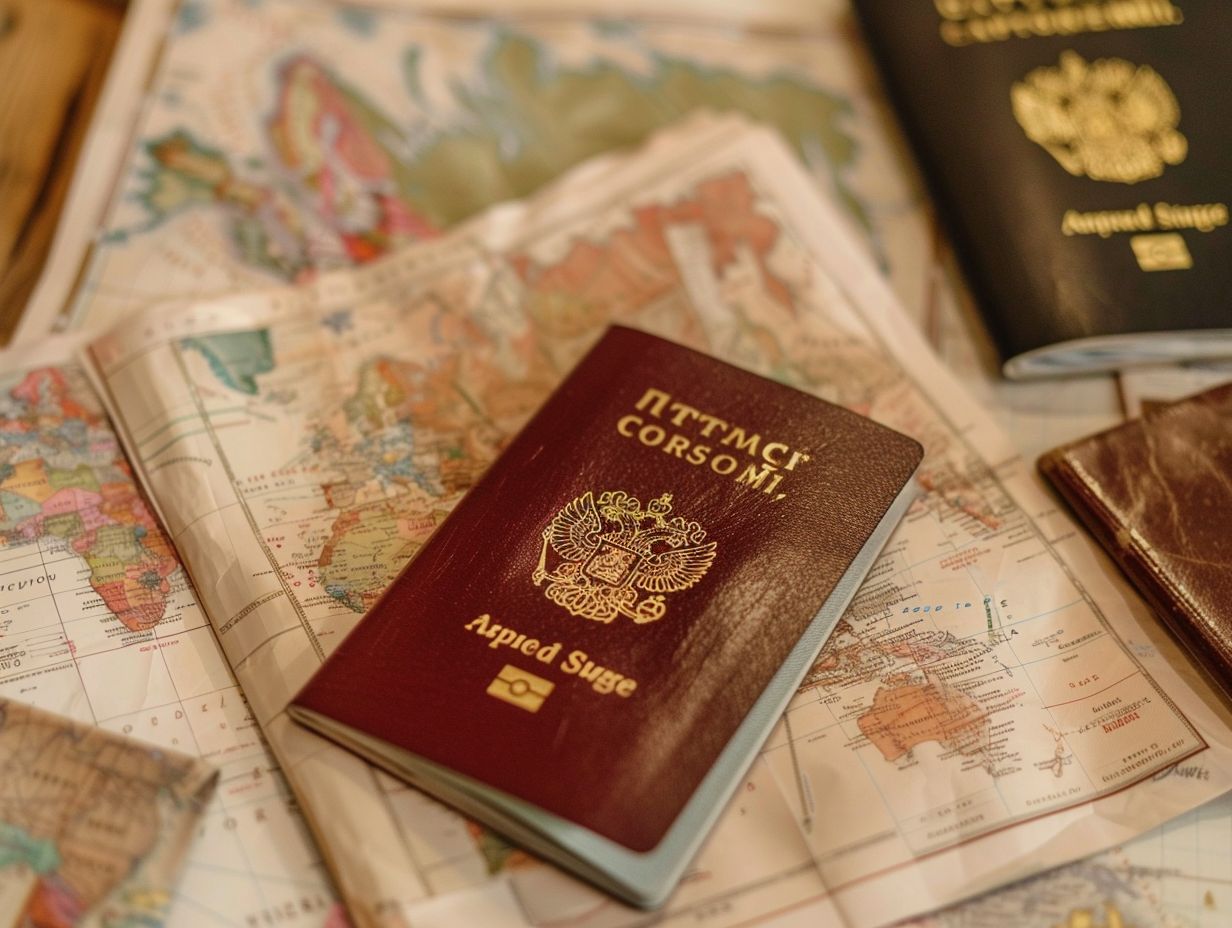Feeling overwhelmed by the process of gathering all the necessary documents for your immigration application?
In this article, we’ll give you a comprehensive overview of the required documents, including personal identification documents, proof of financial support, evidence of relationships (if applicable), and additional supporting documents.
We’ll also share valuable tips on organizing and submitting your documents, common mistakes to avoid, and how to effectively translate non-English documents.
Stay tuned for all the essential information you need to successfully complete your immigration application.
Overview of the Process

When going through the immigration process, you need to take care of a few key things. First, gather up all the documents you’ll need, fill out those application forms, and make sure you understand what your visa requires. Don’t forget to provide identification like your passport and proof of residency or citizenship. Following a checklist can help you make sure you’ve covered all your bases. Once everything’s in order, send off your application to the right people or embassy, and don’t forget to pay those application fees before you can get the green light.
It’s super important to have all the supporting documents handy, like birth certificates, marriage certificates (if they apply to you), and any other papers that are needed for your specific visa. These documents act as proof of who you are, your relationship status, and your legal status in your home country. And remember, meeting those submission deadlines is key. Missing them could mean delays in processing your application. Depending on the country, you might have to submit your applications online or in-person at certain centers. Embassies and consulates are there to help you out and make sure you’re following all the necessary steps in the immigration process.
Required Documents for Immigration
When you’re applying for immigration, you’ll have to gather up a bunch of documents that are key to the process. These include things like your passport, visa forms, and proof that you’re a resident or citizen. On top of that, you’ll also need to provide supporting documents like birth and marriage certificates, police clearance, medical exam results, financial statements, work history, and letters from sponsors or recommenders. Just make sure you’ve got all your paperwork in order before you dive into the immigration process!
Personal Identification Documents
When you’re putting together your immigration application, don’t forget about your personal identification documents. You’ll need your passport, proof of residency or citizenship, notarized copies of your birth and marriage certificates, and some recent passport-sized photos.
To keep things running smoothly and avoid any hiccups in the immigration process, it’s super important to have all your documents up to date and properly notarized. Double-check that your passport will be valid for at least six months after you plan to stay and that your photos tick all the boxes when it comes to requirements like clarity and size.
If you need to translate any documents, make sure you get them done by a certified pro to avoid any mishaps. Take a good look at all your paperwork to catch any mistakes or discrepancies, like misspelled names or wrong dates, so you can sidestep any complications down the road.
Proof of Financial Support
In immigration applications, you often have to show proof of financial support to prove that you can support yourself financially. This means you’ll need to provide financial statements, a detailed work history, sponsorship letters, and recommendation letters.
Financial statements, like bank statements or investment portfolios, are key because they give a quick snapshot of your current financial situation. Detailing your job history helps immigration officials see how stable you are and how likely you are to find work in the future. Legit sponsorship letters from people willing to financially support you during your stay are crucial and show a real commitment to your well-being. Recommendation letters also play a role in showing off your character and capabilities, giving your application some extra credibility. Making sure you put all these documents together carefully is important to meet the tough financial requirements set by immigration authorities.
Evidence of Relationship (if applicable)

If your immigration application is based on a family or spousal relationship, you need to show solid proof of this bond. Think birth certificates, marriage certificates, and sponsorship letters – all probably needing a notary stamp.
Want to beef up your case? Throw in joint bank statements, shared leases or mortgage papers, utility bills with both names, family snapshots, and affidavits from relatives or pals vouching for your relationship’s real deal. Oh, and don’t forget: make sure every document gets that notary nod to keep it legit.
Got papers in a different language? Better get those translated right. Else, you could face delays or – yikes! – a rejection. And watch out for slip-ups like handing in old or incomplete docs. Check, recheck, and then check again to make sure all your evidence is current and crystal clear. Don’t let small mistakes complicate your journey through the immigration maze.
Additional Supporting Documents
When applying for immigration, you’ll have to provide more than just your ID and financial documents. Get ready to gather up police clearance certificates, medical examination reports, educational certificates, and language proficiency test results, along with any notarized copies and translations, if needed.
These extra documents are key players in making sure your immigration application is a success. Police clearance certificates show that you’re in the clear when it comes to your criminal record, a crucial piece for proving your eligibility. Your medical examination reports give a snapshot of your health status, proving you meet the health standards for entry. Your educational certificates and language proficiency test results are like your resume – they show off your qualifications and language skills, making you a top choice for immigration.
To get these docs in order, start the process early because getting police clearance and scheduling medical exams can take some time. Keep all your certificates updated and accurate, as outdated or incomplete documents can slow down your application. And when you’re submitting translated copies, make sure they’re done by certified translators to avoid any mix-ups. By pulling together a solid set of supporting documents, you boost your chances of a smooth immigration process.
Tips for Organizing and Submitting Documents
When organizing and submitting your documents for your immigration application, it’s key to do it right to avoid any hiccups in the process. Make sure to create a checklist, figure out if you need to submit online or go in person, and always keep an eye on those deadlines and waiting times.
Common Mistakes to Avoid
To avoid the frustration of rejected immigration applications and the hassle of having to redo everything, you need to steer clear of common mistakes. Be sure to double-check all your documents for errors and make sure you meet all important deadlines.
When you’re sending in your application, don’t rush through those forms! Fill them out completely and accurately. Missing info or providing the wrong details can cause delays or even get your application kicked back. Keep everything organized and make sure you have all the required documents in order.
Get ahead of the game by submitting all your paperwork well before the deadlines. This way, you’ll have plenty of time to fix any issues that pop up. Take these proactive steps, and you’ll up your chances of a smooth and successful immigration process.
How to Translate Non-English Documents

When you’re dealing with non-English documents for immigration purposes, accuracy is key. You’ll want to make sure they meet all the regulations, which often means getting certified translations and notarized copies to tick all the compliance boxes.
As you search for certified translators to help with your document translations in the immigration process, aim for pros who are fluent in both the original language and the target language. This will ensure top-notch accuracy. It’s a smart move to pick translators who are accredited by reputable institutions or hold relevant certifications to guarantee translation quality.
Once you have those translated documents in hand, the next step is getting them notarized for that extra stamp of authenticity. Typically, a notary public will need to verify both the translation and the original document, giving an added layer of credibility.
Keeping up to date on the latest immigration regulations and requirements is crucial to avoid any hiccups that could slow down or complicate your immigration journey. By staying ahead of the game and being thorough in the translation and documentation process, you’ll be able to navigate the immigration system confidently and minimize any potential pitfalls.
Frequently Asked Questions
What Documents Do You Need for Your Immigration Application?
The documents you need for your immigration application will depend on the specific type of immigration status you are applying for. However, some common documents that are typically required include:
What documents do I need to prove my identity?
You will need to provide a valid, government-issued identification document such as a passport, driver’s license, or birth certificate.
Do I need to provide proof of my relationship with my sponsor?

If you are applying for immigration status through a family member, you will need to provide documents that prove your relationship, such as a marriage certificate or birth certificate.
What documents do I need to show my financial stability?
Depending on your immigration status, you may need to provide documents that show your financial stability, such as bank statements, tax returns, or employment letters.
What are some examples of supporting documents for my immigration application?
Supporting documents may include letters of recommendation, proof of language proficiency, educational transcripts, and any other documentation that can strengthen your application.
Do I need to provide police clearance certificates?
In some cases, you may be required to provide police clearance certificates from any country you have lived in. This is to show that you have a clean criminal record.